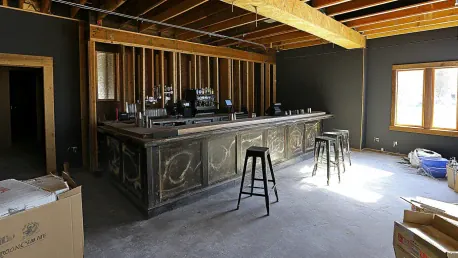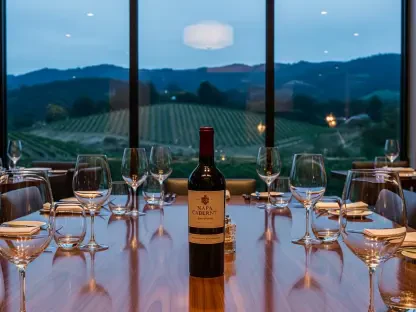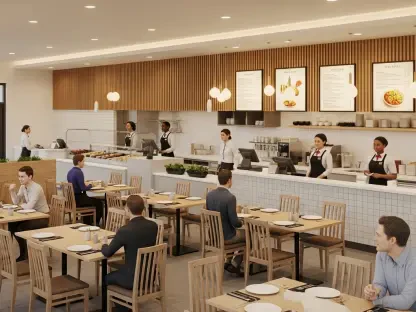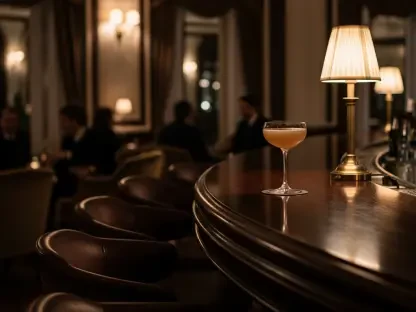The challenges faced by two iconic Denver bars during the ongoing Bus Rapid Transit (BRT) construction on East Colfax Avenue highlight a pressing issue within the local business community. The Squire Lounge and the Lion’s Lair, long-standing establishments emblematic of Old Denver’s cultural fabric, are grappling with the economic repercussions of this extensive project. This construction endeavor is not merely an inconvenience but a significant threat to these beloved institutions’ survival, reflecting broader concerns about urban development and its impact on small, historical businesses.
The Impact of BRT Construction on Local Businesses
Squire Lounge’s Struggles
The Squire Lounge, a multifaceted neighborhood bar and music venue, has been a cornerstone of the East Colfax community for many years. Unfortunately, the ongoing BRT construction has caused a dramatic 40 percent decline in business compared to the previous year. Owner Sudhir Kudva attributes this worrisome downturn to a combination of reduced foot traffic, lack of parking, and diminished visibility, all of which are direct consequences of the construction activities. The BRT project, which aims to introduce a dedicated center lane stretching from downtown Denver to Aurora, has disrupted the economic corridor, which is predominantly characterized by small, independent businesses.
The repercussions for Squire Lounge have been immediate and severe. With fewer customers walking through its doors, the establishment struggles to maintain its status as a local hub for both socializing and live music. The construction’s presence looms large, creating barriers that deter potential patrons. Kudva’s concerns are not unfounded; the business landscape along East Colfax is rapidly changing, forcing historically significant venues like the Squire Lounge to adapt or risk obsolescence. The challenges posed by the BRT project underscore a broader narrative of small businesses battling to preserve their relevance in the face of urban modernization.
The Business Impact Opportunity (BIO) Fund
In response to the financial strain felt by local businesses, the Denver Economic Development & Opportunity (DEDO) launched the Business Impact Opportunity (BIO) Fund. This initiative is designed to provide much-needed financial relief to businesses like the Squire Lounge, which have suffered significant losses due to the BRT construction. Grants are awarded through a competitive application process, with the first round open from February 18 to March 18. Despite this effort, Kudva faces an additional layer of complexity. The Squire Lounge’s ambiguous placement at the intersection where Segment 1 ends and Segment 2 begins complicates the application process, necessitating a strategic approach to secure the necessary funding.
Kudva must navigate the uncertainty of eligibility by initially applying for the Segment 1 grant while keeping Segment 2 as a contingency plan. This ambiguity adds to the stress of running a struggling business amidst continuous construction. Even if successful in obtaining the $15,000 maximum grant, Kudva remains skeptical about its overall effectiveness. He underscores the reality that this amount, although substantial, may barely scratch the surface of compensating for the disruptions caused by two years of construction. Kudva’s pragmatism reflects the broader sentiment among small business owners who continue to sustain their enterprises amid relentless infrastructural changes.
Uncertain Future and Financial Concerns
Grant Eligibility and Effectiveness
For Kudva, the paramount concern is the actual effectiveness of the BIO Fund grants. Even if awarded the maximum of $15,000, the financial support might not be sufficient to offset the prolonged economic disruptions stemming from the two-year-long construction project. The reality is sobering; the marginal relief offered by the grants might only serve as a temporary lifeline, delaying the inevitable if business conditions do not improve. Kudva’s acknowledgment of this limitation highlights the need for more comprehensive solutions that extend beyond immediate financial aid to address the broader economic impact of urban development projects.
The extended timeline of the BRT construction adds another layer of complexity to the survival of businesses along East Colfax Avenue. While the immediate goal is to secure the necessary funds to weather the ongoing disruptions, the long-term viability of maintaining a bar on Colfax remains in question. Property taxes and rent are continually rising, further straining the business model. The combination of these factors paints a grim picture for Kudva and other small business owners who face mounting challenges in an ever-evolving urban landscape. The struggle to preserve Old Denver’s cultural essence amidst modern infrastructure projects underscores the delicate balance between progress and heritage.
Lion’s Lair’s Immediate Challenges
Further down East Colfax from the Squire Lounge stands the Lion’s Lair, another iconic bar deeply entwined with Denver’s culture. Unlike the Squire, the Lion’s Lair is unequivocally located within Segment 2 of the BRT plan, rendering it ineligible for the first round of BIO Fund grants. This leaves co-owner Tony Meggit and his team anxiously waiting for future application timelines to be announced. In the meantime, the Lion’s Lair is experiencing immediate challenges, including the elimination of street parking and anticipated sidewalk reconstruction, which will significantly hamper customer access.
The practical implications of these disruptions are profound. With no clear timeline for subsequent rounds of the BIO Fund, the Lion’s Lair must navigate the current adversities with limited resources. The existing parking constraints coupled with plans to tear up the front sidewalk exacerbate access issues, posing a logistical nightmare for both patrons and employees. Meggit points out that the rear entrance, which could serve as an alternative access point, is often misused by the homeless community, setting the stage for further complications. In such a scenario, maintaining patronage becomes an uphill battle, further threatening the establishment’s survival.
Community Support and Resilience
Collaborations and Community Efforts
Amidst these challenges, the importance of community support has become more pronounced than ever. Tony Meggit underscores this by revealing a critical partnership with Walgreens, the neighboring store that has agreed to let Lion’s Lair patrons park in their lot during the construction period. This collaboration not only demonstrates the resilience of local businesses but also highlights the spirit of solidarity that defines community interdependence. Such alliances are crucial in navigating the crisis, providing a semblance of stability and access, which are essential for sustaining business operations during disruptive times.
This cooperative effort between the Lion’s Lair and Walgreens sets a benchmark for other businesses in similar predicaments. It illustrates how community collaboration can alleviate some of the immediate hardships, allowing small businesses to continue functioning despite external adversities. The goodwill gesture by Walgreens reflects a broader understanding that preserving cultural landmarks requires collective effort and shared responsibility. These small acts of solidarity build a foundational support system that can play a vital role in helping local businesses endure the challenges posed by urban development projects like the BRT construction.
Broader Economic Pressures
Both Kudva and Meggit are acutely aware of the broader economic pressures that compound the difficulties posed by the BRT construction. The rise in property taxes and rental prices presents an additional layer of financial strain, making it increasingly difficult for small businesses to sustain their operations. This ongoing financial burden intensifies the precarious situation for establishments like the Squire Lounge and Lion’s Lair, forcing owners to constantly reassess their business models in an effort to adapt to the changing economic landscape. The evolving dynamic underscores the broader issue of urban development overshadowing the historical essence and cultural significance of Old Denver.
The lament for the fading culture of Old Denver is palpable among local business owners who strive to uphold the city’s historical identity amidst relentless modernization. The infrastructural projects, while aimed at improving urban transportation, inadvertently place immense stress on the very businesses that contribute to the city’s unique character. As property taxes and rents continue to escalate, the economic viability of maintaining longstanding establishments becomes a contentious issue. Kudva and Meggit’s concerns reflect a universal issue faced by small business owners in rapidly developing urban centers – the constant battle to preserve cultural heritage against the march of progress.
The Fight to Preserve Old Denver Culture
Nostalgia and Economic Shifts
The narrative of the Squire Lounge and the Lion’s Lair serves as a microcosm of the heightened tension between urban development and the preservation of cultural heritage. The broader theme of urban development’s harsh impact on small, historical businesses comes into sharp focus against the backdrop of these beloved Denver bars. While the city’s efforts, such as the BIO Fund, aim to provide financial relief, the magnitude of economic shifts necessitates more comprehensive solutions. The struggle to maintain the essence of Old Denver amidst relentless modernization is emblematic of the challenges faced by small businesses nationwide.
The nostalgic term, “Old Denver,” embodies a cultural heritage that is increasingly at risk of being overshadowed by contemporary urbanization. For business owners like Kudva and Meggit, maintaining the distinct charm and historical relevance of their establishments goes beyond mere financial considerations. It’s an ongoing battle to keep the spirit of community and cultural heritage alive in the face of transformative urban projects. The enduring spirit of these community businesses stands as a testament to resilience, while also highlighting the pressing need to balance progress with preservation.
Community’s Role in Preservation
The ongoing Bus Rapid Transit (BRT) construction on East Colfax Avenue presents significant challenges to two landmark Denver bars, The Squire Lounge and the Lion’s Lair, showcasing a critical issue within the local business community. These long-standing establishments, which are integral to the cultural essence of Old Denver, are wrestling with severe economic fallout due to this extensive project. The construction is far more than just an inconvenience; it poses a substantial threat to the survival of these cherished institutions. Their struggle underscores broader concerns about urban development’s adverse impact on small, historical businesses. While urban growth and modernization are often viewed as necessary, they frequently come at a high cost to the local heritage and culture. The survival of The Squire Lounge and the Lion’s Lair during this tumultuous period serves as a poignant reminder of the delicate balance needed to preserve the unique character and history of cities while embracing progress.









